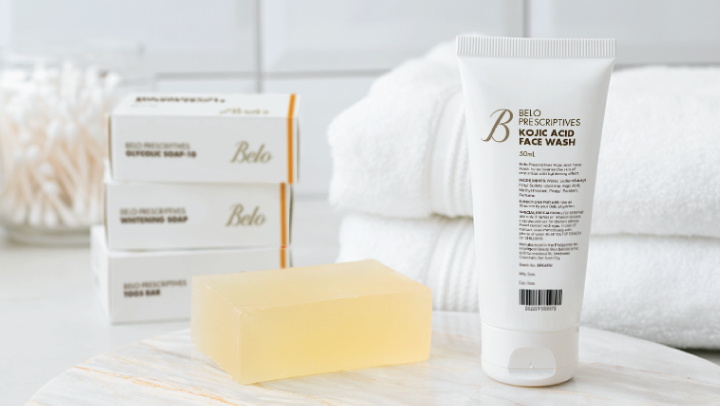Are Alcohol-Based Toners Bad For Your Skin?
February 16, 2021

We use it more than once every single day, especially lately with a virus wreaking havoc on humanity. Bar soap is something we need regularly but barely think about. Have you ever thought about the safety of the bar soaps you use at home?
Lifestyle writer Deanna Pai wrote on health and fashion website Glamour, “Bar soaps suck. They’re slimy, they’re slippery… If you have the option of using a shower gel, why would you ever use bar soap? It’s like having the chance to drive a car but choosing to use a horse and carriage.” Not all of us may have such strong opinions about bar soap, but the differences between bar soap and shower gels do go beyond personal preferences.
According to Healthline, “bar soaps break this oily layer apart and lift pathogens away from your skin.” If you want to see how soap works against bacteria and viruses, you can watch this excellent explainer by Vox.
In the same Glamour article, cosmetic chemist and founder of Cosmetic Science Innovations, Al-Nisa Ward, says “traditional bars can cause dry, dehydrated skin due to their high pH,” which makes it alkaline. And because our skin is naturally acidic (with a pH level of around 5), most soaps can disrupt the skin’s natural pH level, which could cause some skin issues as Ward mentioned. If you want to use a bar soap that’s more gentle on the skin, you can check out Belo Prescriptives Whitening Soap, which gently cleanses and brightens the skin using natural ingredients like licorice extract, vegetable oil, stearic acid, lye, sugar, purified water, and hydroquinone.
The thing is, our body has slightly varying pH levels, like our face (which is ever-so-slightly more acidic compared to the rest of the body) and even a woman’s nether regions (which plays around 3.8 to 4.7 pH). So it might not be the best idea to use an alkaline bar soap all the time for a long period.
In the same Healthline article, it says you must look for the following ingredients when choosing the soap that’s right for your skin: glycerine (a plant-based cleanser that can seal moisture into your skin barrier without stripping your skin of oils), natural exfoliants (like finely ground walnut shells, oatmeal, or apricot pits), essential oils (like lemon oil, rose oil, lavender oil, cedarwood oil), and moisturizing oils (like coconut oil, sweet almond oil, which also have skin-softening properties, shea butter, and coconut butter).
So when it comes to your face, it’s best to use a different bar of soap designed specifically as a facial soap, like our acne-fighting Belo Illuminating Soap, which contains snail mucin, salicylic acid, and coconut oil; Belo Glycolic Soap (available in 5% and 10% concentrations) for younger, brighter skin; and Belo Prescriptives TOG Soap, a gentle moisturizing facial soap created for dry and sensitive skin.
Another concern about dar soaps is its tendency to home bacteria. Yep, the very substance that’s supposed to fight them off may be harboring them on its very surface. Dr. Tatyana Petukhova, a dermatologist at Weill Cornell Medicine and NewYork-Presbyterian, tells health and beauty website SELF that most of the germs on our bar soap are probably from our own skin, but it’s not that much of a problem because “it’s estimated that about half the cells in the human body are bacteria, and a lot of those live upon your skin, helping to make up what’s known as your skin microbiome” and it’s important for our immune system. It’s also easily taken care of by simply lathering the bar in some water for about 20 seconds before using it on your body. This will disintegrate any germs, bacteria, or viruses living on it.
Our very own Dr. Vicki Belo also brought up the use of these bathing paraphernalia in her podcast, The Beauty Authority. She points out that loofahs usually stay wet for a while inside our showers, so it’s the ideal breeding ground for molds, germs, and bacteria, which could be transferred to our body. Synthetic wash cloths are slightly better, but it’s still best to make sure they are dry before every use.
So is it safe to keep using bar soaps? Absolutely. There’s a really, really small chance that you’ll get sick because of bar soaps, according to experts. Since the soap itself can get rid of pathogens by the act of lathering, transferring bacteria and germs rarely happen. Bar soaps have been around for ages for good reason. And with constant advancements in chemistry and dermatology, manufacturers are constantly improving their formulations. So keep using your bar of soap, just make sure to remember three key things: (1) lather up your soap and washcloth or loofah at least 20 seconds before using it on your body, (2) make sure your soap is placed is a well-draining container to give it a chance to dry up in between use, and (3) if you’re using a loofah or washcloth, rinse it thoroughly and hang it up where it can dry well after every use.
For more expert-recommended skincare products, check out the Belo Shop.